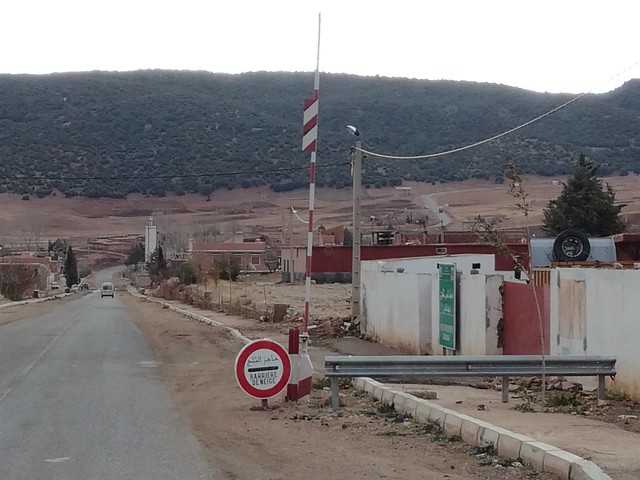Foreigners and Locals
It’s time to move on South – we don’t want to get stuck north of the Atlas mountains… we pass a number of snow barriers, reassuringly they are all still open.
It’s also time to search out another camp site – our laundry basket is overflowing and we’re yearning for a hot shower… about midday, we turn into one just north of Midelt. For a couple of hours, we are the only ones on a site that could probably cater for in excess of 50 vehicles, but soon enough a large red lorry rolls up. On the side it says ‘aide humanitaire’. This is a French couple from Perpignan who run a little charity bringing things to Morocco – second hand clothes, shoes, bicycles… whatever has lost its usefulness in the richer Europe but could still be useful or appreciated in Morocco. For the last decade or two, this couple have been to-ing and fro-ing from Perpignan to Morocco about 6 times per year, filling up their lorry in France, distributing it all over Morocco, returning to refill and set out again. They supply schools, villages, or even just people in need by the side of the road. On the surface you’d think what a good idea, rather than throwing things away, to give them a second life where they are appreciated. Underlying this, I have a distinctly uneasy feeling but can’t quite put my finger on it yet. I don’t particularly take to the man who proceeds to walk around inspecting the camp-site, bemoaning the low-hanging branches of trees that might scratch the side of campervans. He seems to be part of an internet site for campers and his word counts, so next day, there are people up on ladders cutting branches. It makes me realise just how vulnerable to negative online comments these places are. In the afternoon, we take a stroll out the back door of the compound, and in our in search of an advertised Eco Park, we come across a very well restored house. We ask for directions to the lake and instead get invited in for a meal. A French guy who runs a 4×4 business (tour guide and repairs etc.) and his Moroccan wife, plus a few French and Moroccan friends are sitting around a table. My French is not completely fluent, so some of the conversation goes over my head, but despite their cordial hospitality and provision of food I don’t feel at ease in this house – it feels somehow colonial. Maybe I’m just feeling uneasy today.
In the evenings we treat ourselves to a meal at the restaurant and we bump into Jacqui and Brandon, two American travellers. They are heading in the opposite direction to us and their stories are quite different to ours. Brandon expresses a frustration with the pushy nature of people (including little children) wanting things from you, and how this gets in the way of making genuine connections. They say they have searched but somehow not found a way into the gentle, welcoming nature of the people here and have instead felt they’ve had to be constantly on their guard, fending off people’s persistent demands.
We compare experiences and try to figure out whether it’s about the different regions we have respectively traveled through, or whether we act in different ways: it seems there is a direct correlation to the amount of tourism in a region.
Later that night, my thoughts turn this over and over. What do we do to people when we just come along and ‘dispense’ stuff – balls, pencils, chocolate, beer, whatever, whilst at the same time they see our possessions inside the vehicle – bikes, binoculars, warm clothes etc. What happens when we just randomly give, without first establishing some kind of relationship that is free from demands, without some sort of human to human exchange, on an equal level? Again and again we see that those who are free of the desire to just get things out of us are proud, rich people (no matter whether they are materially rich or poor), people who feel that they have at least as much to give as they might receive from us.
We are able to meet freely, to learn from each other and to give to each other. That feels very different. By the same token, I find that every time I give something in a situation of demand, I am reinforcing this inequality, the sense that ‘they’ are poor and ‘we’ are rich by comparison. But how does one step out of that dynamic? We managed to do so in the school up in the forest, by giving children the idea of making their own balls and teaching them how to juggle, but how about the person who flags us down by the road side just outside of a city? How about the hungry/thirsty woman with a baby? Or the 7 school children in a deserted valley who get quite cocky with their demands? Each situation seems to demand a new tactic, a new ploy, to bypass the ‘gimme-gimme’ and to reach for the real person behind it. This can be quite exhausting, especially those times when you’ve spent 5 minutes in a seemingly nice conversation only to realize where it’s actually headed. However, I have to emphasize that we haven’t experienced much of this so far. If I have to put a percentage, I’d say 5% only of our interactions have needed that creative steering. However, I’m worried that we may get more practice, as we are about to head into more touristic areas.
For some photos of the landscape we traveled through on this day, click here
Posted in Uncategorizedwith comments disabled.
